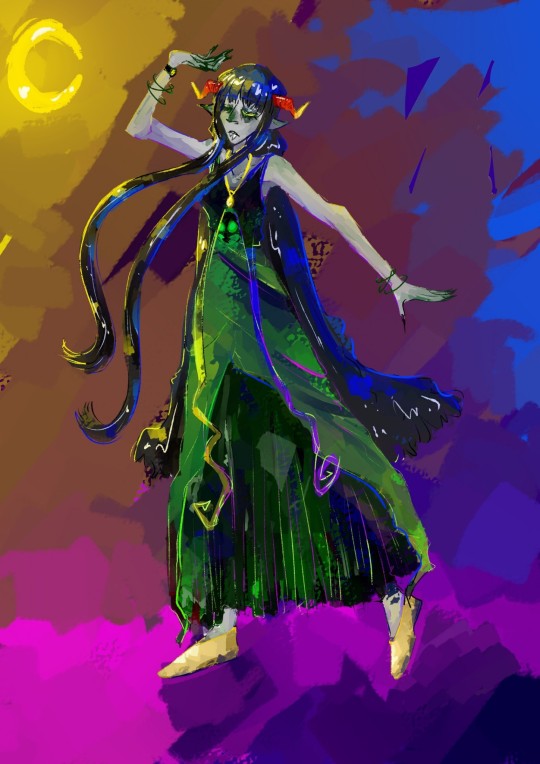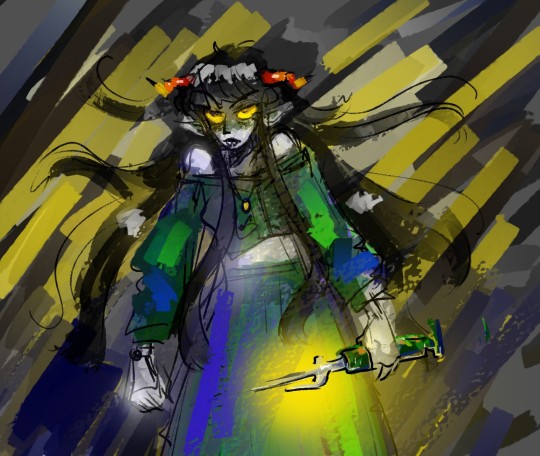#sylph of doom
Text
The 12 Classes of Doom.
“Doom is the Aspect of inevitability, destiny, fate, conformity… Doom Players are known to be good listeners, people who understand and will empathize, even if they don’t know how to fix many issues. They seem to be okay with fate, with the way things work, with both contentment and pain. Doom Player Sollux knew that he was going to die, and he accepted it, knowing nothing could be done about it. Doom can be heavily emotional”.
“Doom is a poetic Aspect, and it’s extremely interesting, although rarely depicted in the comic. A Doom Player’s struggle might be about acceptance, a doubt about how it all is supposed to work. It is realistic and skeptical, not always pessimistic instead. Doom can be stability, having an outlook on life that is healing in their own way. I have heard from a Doom Player that “the Life-Doom Aspect pair is the facet of a person that deals with healing. While Life heals through change and improvement, Doom heals through acceptance and adjustment”. This difference is sometimes described as “the vent friend” (Doom) and “the advice friend” (Life). Life is the opposite Aspect to Doom, and it is serving and helpful”.
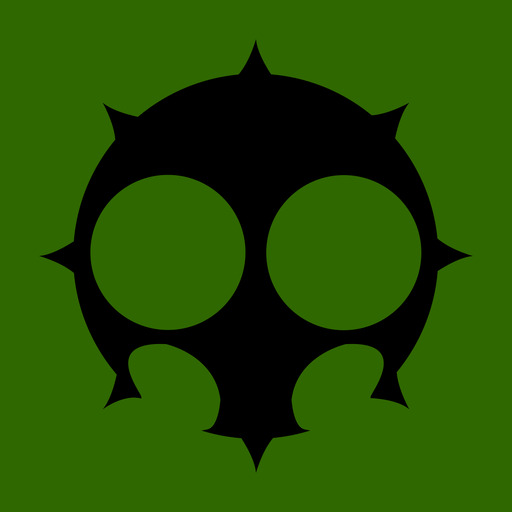
Sburb Players each have a combination of an Aspect and a Class. Aspects are understood to represent what a player’s goals and actions in life are caused by. A Class is within an Aspect and understood to represent the way they deal with their Aspect.
The Sburb Classes are Maid, Page, Mage, Knight, Rogue, Sylph, Seer, Thief, Heir, Bard, Prince, and Witch. (Lord and Muse*)
(*Classes Lord and Muse seem to only be possible in either Cherub society or in two-player sessions. They are very absolute and it’s rare for a human to identify with their descriptions. I will have to leave them out here and only write about the remaining twelve :)
Adding the Classes to the Aspect of Doom will result in twelve God Tiers. My analyses of them are as follows:
1st God Tier: Witch of Doom
Witch is the Active Class of manipulation. Witches are known to “control” their Aspect, both literally and figuratively. A Witch of Doom, specifically, would be one of the most repressed people in their lives, always shutting off what should be natural (though they would not be blind to it, they’re not naive about what fate is supposed to bring, they simply no not want to accept that it is true). Witches are characterized by rebellion, and Doom’s rebellion is against fate, the condemnation, sometimes even death. It is impossible to escape from your Aspect but they try their best, but does escaping from destiny not end up becoming your destiny?
Witches of Doom are the most frightened of Witches, but they’re also probably the strongest. I can see them being good liars, and pretty optimistic people, maybe trying to hide the realism or nihilism that might be building up inside them, begging to be seen. They would want to appear more as a Life Player, be helpful and free from destiny and/or suffering. It is through accepting suffering that they will become well-developed Doom Players.
2nd God Tier: Heir of Doom
Heir is the Passive Class of manipulation. Heirs are known to “influence” their Aspect or through their Aspect, both literally and figuratively. An Heir of Doom, specifically, would passively manipulate fate in a way that might be shown as “coping”, maybe tricking themselves and those around them into believing the opposite of the truth, for example, that everything will be okay when in reality they know it won’t. It can also be the opposite, if they are mostly negative; they could bring people to believe that a perfectly safe and fine situation will actually end in great tragedy. They don’t do this on purpose all the time, though, and unlike Witches, they have more control of that power. It’s not only their way of dealing with fate, it is also what they are naturally inclined to do. The challenge in an Heir of Doom’s life would be not being in control of what is to come.
Heir of Doom is a canon Homestuck God Tier. Mituna Captor is the character that holds that title.
3rd God Tier: Mage of Doom
Mage is the Active Class of knowledge. Mages are known to “understand” their Aspect or through their Aspect, both literally and figuratively. A Mage of Doom, specifically, would be aware of everyone’s fates and their own as well. I guess in a non-fantasy world that would be through “connecting the dots” and great observation skills. Mages are the most aware of where they are and of what their Aspect means, so Mages of Doom would be completely accepting of, you know, acceptance itself. In subtle cases they might be realistic people who don’t try to defeat their doom, and in extreme cases they might be people who are completely in peace with the fact that they are going to die. It will depend from Player to Player, but Doom will usually have a connection with suffering. Mages of Doom would be understanding of everyone’s suffering, maybe the perfect empaths. Their mind would never be focused on fixing the inevitable, they only accept it as it is; because if it’s meant to go this way, it’s for a good reason. They don’t go against fate.
I like to believe a Mage of Doom would read this and go “yeah. Guess I’m a Mage of Doom then”.
Mage of Doom is a canon Homestuck God Tier. Sollux Captor is the character that holds that title.
4th God Tier: Seer of Doom
Seer is the Passive Class of knowledge. Seers are known to “study” their Aspect or through their Aspect, both literally and figuratively. A Seer of Doom, specifically, would analyse fates and what they might be, what might be hidden behind them, what the reasons for them might be… They are analysts, like every Seer, but of what wouldn’t really appeal to others; of death, suffering, drama, the inevitability of many aspects of life. Seers of Doom would be really interesting people with many interesting hobbies. I can see them, like some of the Time Players, enjoying collecting bones, or rocks that not everyone would notice on the beach. They are probably drawn to endings, and I mean this in the most innocent way. I can connect Doom and Time pretty often, because both overlap when talking about finality; Time for the rush reason and Doom for the fate reason. Does that make sense? Seers of Doom might be really good at understanding how something is going to end, studying situations to figure out motives. What differs them the most from Mages is that they would watch from afar and not feel as intimate with destiny as Mages would.
I don’t know why, but “Mary On A Cross” by Ghost gives me Seer of Doom vibes.
5th God Tier: Thief of Doom
Thief is the Active Class of stealing. Thieves are known to “take” from their Aspect and through their Aspect, both literally and figuratively. A Thief of Doom, specifically, would take advantage of their own ideas of destiny to try to benefit other areas of their life. I see the stealing classes as the most unrelated classes to their Aspects, it is harder for me to figure out who is a Thief or a Rogue, but I can tell that most Thieves are tempted to steal “for themselves”. This has never meant they are self-focused or self-fulfilling, it just means they are less naturally inclined to sacrifice themselves in the name of others. Thieves are usually very comfortable in their Aspects, not ever doubting it, and instead taking every chance they have to perfect it. In a concrete way, a Thief of Doom would, for example, use other’s pessimistic moments to lecture them about it, showing off their certainty in whatever destiny they believe is coming to them. Being comfortable in their Aspect, they would not be affected by suffering as much, they would feel at ease with pessimism. They are confident that if it is the right thing, it’s going to benefit them one day.
6th God Tier: Rogue of Doom
Rogue is the Passive Class of stealing. Rogues are known to “redistribute” their Aspect or through their Aspect, both literally and figuratively. A Rogue of Doom, specifically, would be either defined by sweetness or by incapability. Let me explain, Rogue is a Class that is described to be giving, and with this particular Aspect, it could mean sweet but also dangerous things. A Rogue of Doom might be a great listener, giving away their time to empathize with people or make them feel heard at least, but they might also have extreme sides, like (taking the Aspect more literally) leaving their fate in others’ hands or even being killed by them, due to their own incapability to center their Aspects on themselves.But this being said, every God Tier has macabre interpretations that are not great to think about, but this one stood out to me. Being a Rogue of Doom doesn’t guarantee that a person will leave their destiny up to others, but it facilitates it.
7th God Tier: Knight of Doom
Knight is the Active Class of utilizing. Knights are known to “handle” their Aspect and through their Aspect, both literally and figuratively. A Knight of Doom, specifically, would be the biggest stereotype of Doom, pessimistic and used to suffering and being in the middle of the action. “The action”, in the Doom Aspect, can mean death of relatives, for example, and a Knight of Doom might be used to dealing with that. (This characteristic is also present in Knights of Time!) Otherwise, it can mean constantly having to handle and/or explain inevitability to others. Knights might not be the biggest fans of their Aspect, but they will accept it and not even complain that much. This is an interesting fact in Doom too, would they accept… acceptance?
The song “As the World Caves In” reminds me of this God Tier.
8th God Tier: Page of Doom
Page is the Passive Class of utilizing. Pages are known to “rise” their Aspect or through their Aspect, both literally and figuratively. A Page of Doom, specifically, would carefully and sometimes accidentally deal with the sensitive topics of suffering, death, finality of all things. It will all naturally come to them, in a way they really have no control or awareness over, and they will accept and accept and just handle everything because that’s the only thing they can do. Differently from Knights, they might feel like they’re useless in relation to the inevitability of change. Their main challenge will be learning how they are balanced in whatever chaos of destiny is happening around them. Pages have the potential of being the strongest Class when they learn the patterns of how they deal and how they should deal with their Aspect. I can see a Page of Doom just feel like they are following and not adding anything to the world, because things always happen without their input so how are they affecting anything? (If there’s any Page of Doom reading this, it’s not true; we are all affecting the world.)
9th God Tier: Maid of Doom
Maid is the Active Class of construction. Maids are known to “create” their Aspect or through their Aspect, both literally and figuratively. A Maid of Doom, specifically, would create their own fates! Maids are MADE of their Aspect, Maids of Doom are made of destiny and the ideas of suffering and comformity! Though it is the Active Class of construction, it is also a Class that serves, so it is also important to note that Maids of Doom would do anything to benefit destiny, whatever it might be. They are not the class that knows, they are the class that is.
I find Maids of Doom interesting, because how do you create something that to most others, just comes along on its own? Well, Maids have their technique of building, they will do what it takes until they feel like they are doing their job in a satisfying way. A Maid of Doom might be obsessed with living a perfectly spontaneous life, if that makes sense. They are attending to fate and building themselves from it!
10th God Tier: Sylph of Doom
Sylph is the Passive Class of construction. Sylphs are known to “build” their Aspect or through their Aspect, both literally and figuratively. A Sylph of Doom, specifically, would passively work with fate in order to make it easier to deal with, and then build upon it. I can see them as controlling and bossy about the Aspect. To use a random example, I can see them getting angry at someone who gives them advice, because that is not how Doom works. It’s inevitable and unchangeable, and it is the right thing to follow. I always see Sylphs as possessive of their Aspects, like they are the only ones who can take care of it, even if abstractedly. A Sylph of Doom would make their own interpretations of what their doom should be (maybe even macabrely, how their end should be) and will live their lives with those opinions very close to them at night.
11th God Tier: Prince of Doom
Prince is the Active Class of destruction. Princes are known to “wreck” their Aspect and through their Aspect, both literally and figuratively. A Prince of Doom, specifically, would seem pretty edgy. They’d want to be as positive as Life Players, but would fail miserably and fall back into their inevitable pessimism about inevitability. Unhealthy Princes try to escape from their Aspect, and everyone starts unhealthy. They would be constantly worried and angry at their own destiny, and would be awfully aware of it (Mage is the Class of knowledge, but Prince is the one of awareness!) despite their attempts. Destruction can be literal, in this case it might be breaking objects related to fate, like breaking the weapon that is trying to kill you, “biting the hand that feeds you”.
I like to use the song Call Me What You Like by Lovejoy for this God Tier. Especially “I’m not paranoid, I’m a realist; I know you’re gonna kill me”. I also like to say that, while fate is the correct and natural thing to most Classes, to Princes of Doom, it is the wrongest path of all.
12th God Tier: Bard of Doom
Bard is the Passive Class of destruction. Bards are known to “deconstruct” their Aspect or through their Aspect, both literally and figuratively. A Bard of Doom, specifically, would not purposefully ruin fate’s plans, but would definitely cause that ruin. Think of the term “back to black”, and the inevitability of going back to old patterns and to what happens spontaneously. Bards have a hard time accepting their Aspects, and can go through weird and unbelievable phases with it. This particular Bard could have a complicated relationship with the fact that everything ends, and other times that some things are infinite, they might at one time be okay with death and at another lose their minds about it. Regarding fate, they don’t know they’re against it, but everything they do works in favor to annulate it. Like Princes, they might prefer the idea of belonging to the opposite Aspect (Life), being more positive and less complicated and ever-changing.
#sburb#god tier#classes#doom#witch of doom#page of doom#mage of doom#knight of doom#rogue of doom#sylph of doom#seer of doom#thief of doom#heir of doom#bard of doom#prince of doom#maid of doom#homestuck
67 notes
·
View notes
Text
Camile Acleon, Sylph of Doom, Derse
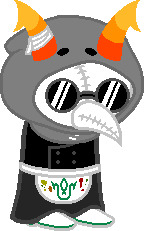
They/them
Resident cavern medic
Suture or sever?
Fascinated by mutant grubs
Land of Melancholic and Clinics
#homestuck#homestuck oc#hiveswap#fantroll#fan troll#extended zodiac#sylph of doom#jade#jade blood#sylph#doom#derse#virmini#mod lepio
43 notes
·
View notes
Text
doom playlists! below the cut!
maid of doom
page of doom
mage of doom
knight of doom
rogue of doom
sylph of doom
seer of doom
thief of doom
heir of doom
bard of doom
prince of doom
witch of doom
#homestuck#homestuck ocs#doom aspect#homestuck godtier#maid of doom#page of doom#mage of doom#knight of doom#rogue of doom#sylph of doom#seer of doom#thief of doom#heir of doom#bard of doom#prince of doom#witch of doom
22 notes
·
View notes
Text
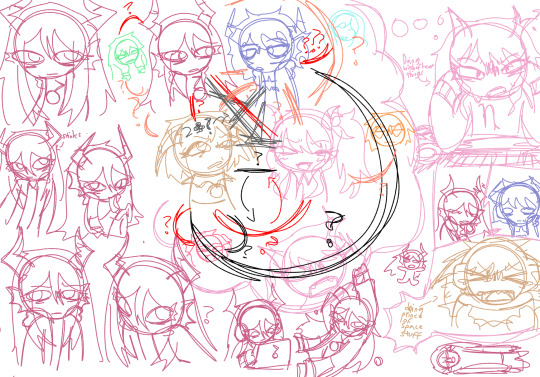
sekaistuck (but almost only niigo)
#sekaistuck#kanade#kanade yoisaki#mafuyu#mafuyu asahina#ena shinonome#ena#mizuki#mizuki akiyama#transmasc#transmasc mafuyu#homestuck#homestuckie#witch of heart#prince of space#sylph of doom#heir of void#fantroll#fantrolls#art#sketch#sketches#lazy art#artist
15 notes
·
View notes
Text

redesigned some fantrolls I made when I was 12
they are in gay love
#drawing#fantroll#trollsona#ocs#oc artwork#homestuck fanart#indigoblood#rustblood#witch of light#sylph of doom#homestuck
21 notes
·
View notes
Text
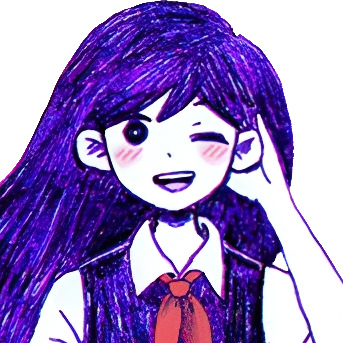

MARI is a SYLPH of DOOM!
Requested by anonymous!
13 notes
·
View notes
Note
I just wanna say i love your analyses. im not even into homestuck that much and really only pay attention to like 2 characters and the classpect system, but your analyses on the characters and the story are always so interesting to read, and its nice to see someone who is just. so aware of it, especially of the more problematic aspects of homestuck (like its antiblackness, ableism, and the infantilizing of characters like mituna and kankri within the fandom). as a blk person its refreshing to see someone acknowledge it because most of the time i feel like these things are so swept under the rug, especially by other nonblack fans...
besides that, id like to ask. what are your thoughts on sylphs as a class and how sylphs who are doom, void, timebounnd (you know, aspects that are normally seen as "negative") interact with their aspect? i feel like out of any class, they're the ones that are difficult for me to understand. id just like to hear your thoughts!
Aww, thank you so much! This is an absolute DELIGHT to hear. I'm glad my work has held so much value to you!! It really does mean a lot. Glad I'm doing something right in your eyes. :)
Homestuck has been a deep passion of mine for years now, and I find that it's physically impossible to earnestly and completely tackle it without directly confronting the layers of bigotry that Hussie was operating under while writing the comic. The comic is so overtly caked in it that it affects even the most basic meta of it all- foundational parts of the story are infested with it like termites. Classpecting is an example. Even the magic system isn't free of it! I don't see very many people bring that up, but then again, I don't see very many people bring up literally any of the Anti-Blackness in the comic, like... Period. It fucking sucks. But that's what I'm here for, in part. If no one else will do it, then I will- and gladly so, because it really ought to be discussed more.
And, to answer your question about Sylphs of Doom, Void, and Time...
Sylphs either Mend or Create, depending on circumstance. They largely intend to maintain stability of their Aspect within themselves and their session, and are eager to speak about their own perspective + experience with their Aspect, should you let them do so. The presence of a Sylph tends to imply an excess of their Opposite Aspect.
Doom is, largely, the Aspect of Rules, Restriction, and Sacrifice. The job of a Sylph of Doom is to keep these things in check- Mending where it's needed, or Creating where it's needed. To use Sovereignstuck as an example, a Sylph of Doom could take on the role of a Game Patcher/Moderator, making sure the active session follows whatever set rules were given... Perhaps a little too strictly.
Void is, largely, the Aspect of Obscurity, Nothingness, and Oblivion. Mending these may require active deceit... Though that's not necessarily a bad thing. An excess of Light is a frightening thing indeed- though largely seen as a positive Aspect, Light is about Chaos and Uncontrollability, and even the slightest amount of unchecked excess of it can snowball and tank a session.
Time is, largely, the Aspect of Entropy, Fate, and... Well, Literal Time. The job of a Sylph of Time tends to imply the stabilization and restoration of Timelines. They maintain linearity- keeping the threads of Fate from getting tangled into a terrible mess. Not to bring up Sovereignstuck again, but we also have a Sylph of Time, and she aids greatly in keeping the timeline- and therefore the narrative- straightforward. A Sylph of Time would prevent the story from becoming as much of a tangled mess as Homestuck proper is... Dave was never good at keeping things clean.
I hope these explanations were adequate! Feel free to ask for any clarification you need, thank you for valuing my opinion, and I hope you have a lovely day!
#homestuck#homestuck meta#homestuck analysis#homestuck classpect#sylph class#doom aspect#void aspect#time aspect#sylph of doom#sylph of void#sylph of time#sylph.pdf#doom.pdf#void.pdf#time.pdf#nekro.pdf#nekro.sms
63 notes
·
View notes
Text
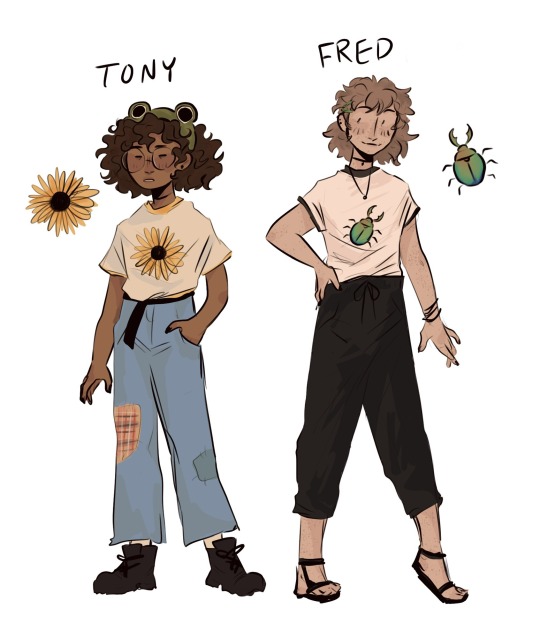
made some homestuck oc’s!! Toni and Fred (short for Winifred) Toni is the Sylph of Doom and Fred is the Knight of Space
21 notes
·
View notes
Note
Tacenda Bronya?
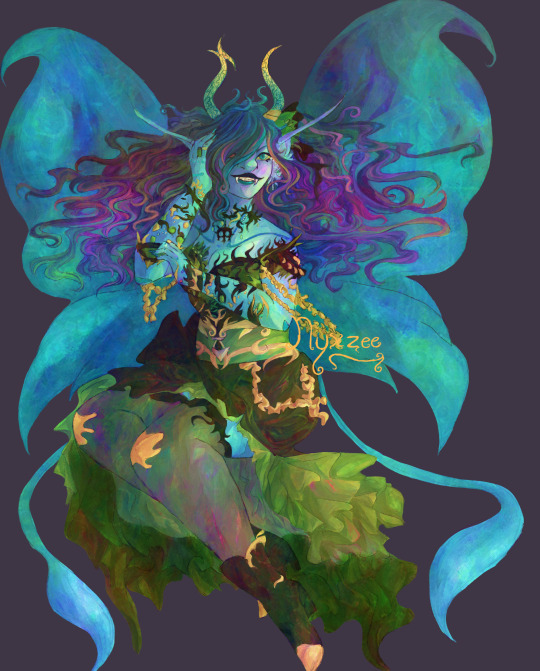
she fights for lowblood rights, still the mom friend but she's not afraid to kick your ass if you fuck with her and her friends
you're still welcome to send in tacenda requests! (meulin and folykl/kuprum are my current requests)
80 notes
·
View notes
Text
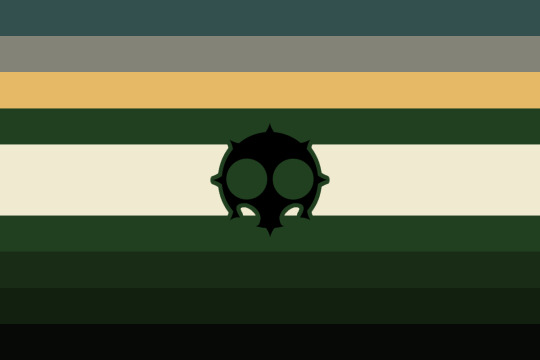
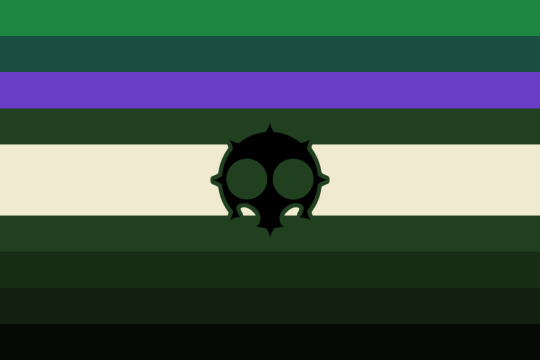
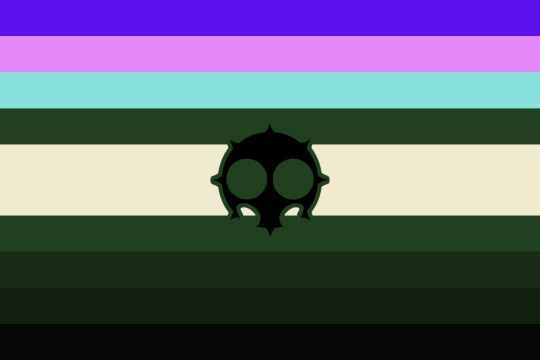
[IMAGE ID: three horizontal flags with nine stripes; each flag has the doom aspect symbol in the center; a circular black skull with small spines poking out of it. it is outlined in medium green. the middle stripe is twice as large as the rest of them, which are equally sized. the first flag has these top three colors: dull green, warm grey, and dull yellow-orange. the second flag has these top three colors: medium green, dark cool green, and deep purple. the third flag has these top three colors: bright purple, bright cool pink, and bright teal. each flag has these bottom six stripes: medium green, off-white, medium green, dull green, dark green, and black. END ID.]
doomasirogue: a gender connected to being a rogue of doom; this gender is connected to the doom aspect, doom aspect aesthetics, rogue aesthetics, chaoticness, and xenzh genders!
doomasylph: a gender connected to being a sylph of doom; this gender is connected to the doom aspect, doom aspect aesthetics, sylph aesthetics, elemental, airy, or ethereal aesthetics, and nadelvinity!
doomaseer: a gender connected to being a seer of doom; this gender is connected to the doom aspect, doom aspect aesthetics, fortune-telling or prophetic aesthetics, and oracrinity!
@radiomogai @liom-archive @obscurian @drowntowns @electrosaccharine
#doomasirogue#doomasylph#doomaseer#rogue system#sylph system#seer system#doom aspect#rogue of doom#sylph of doom#seer of doom#xenzh#nadelven#oracrystular#mogai gender#mogai coining#gender coining#tech.png
2 notes
·
View notes
Text

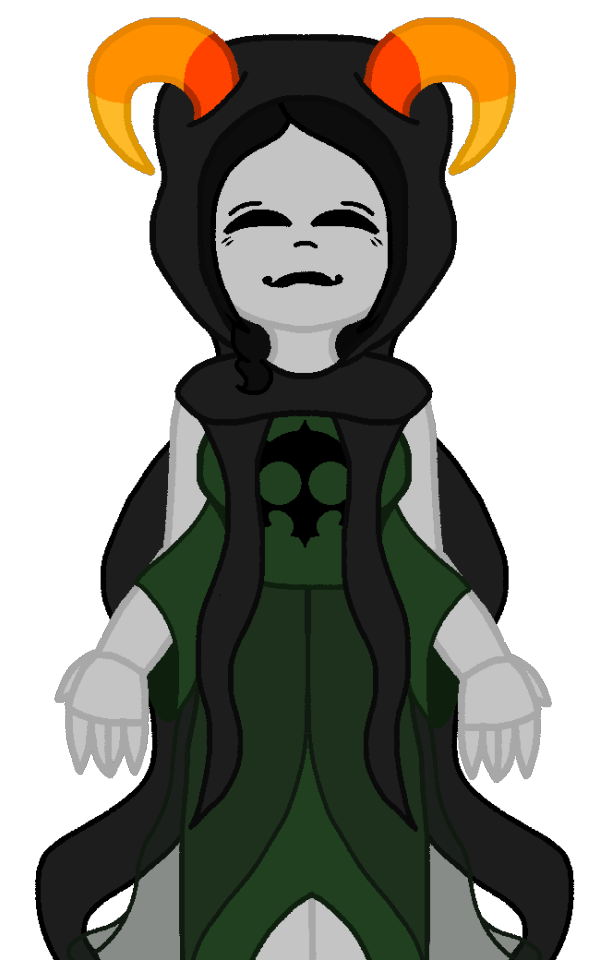
Decided to do a little Godtier doodle of my girl Ninara
My precious little Sylph of Doom <3
I used @coffeecats900 's redesign of the Sylph godtier! I made one version w/their Doom colors and one w/the canon Doom colors! Design was a little challenging, but incredibly fun to do!
Decided to do a little Godtier doodle of my girl Ninara
My precious little Sylph of Doom <3
I used @coffeecats900 's redesign of the Sylph godtier! I made one version w/their Doom colors and one w/the canon Doom colors! Design was a little challenging, but incredibly fun to do!
Genuinely proud of this. Please share this around if you see it <333
17 notes
·
View notes
Text
Jirini Kraste, Sylph of Doom, Prospit
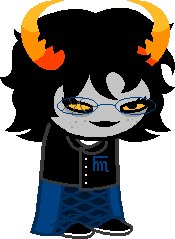
She/her
Has never had a pupil in that eye
Her vision no fold caused her glasses to crack
Spends her free time in public bookhives
Land of Shelves and Fissures
#homestuck#homestuck oc#hiveswap#fantroll#fan troll#extended zodiac#sylph of doom#cerulean#cerulean blood#sylph#doom#prospit#scormino#mod lepio
33 notes
·
View notes
Text
TROLLS!!!!!!
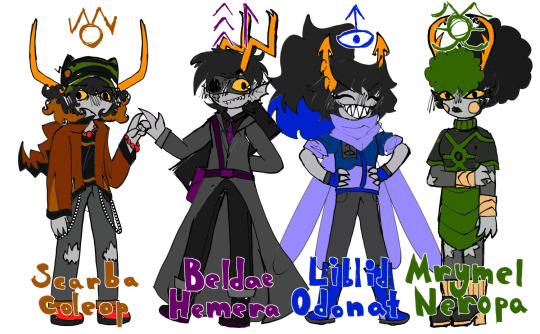
Two more fuckers for the gang
Classpects
Scarba - Mage of Rage
Beldae - Heir of Time
Liblid - Theft of Breath
Mrymel - Sylph of Doom
#homestuck#homestuck art#homestuck fantroll#Scarba Coleop#Beldea Hemera#Liblid Odonat#Mrymel Neropa#mage of rage#heir of time#theft of breath#sylph of doom#my art
2 notes
·
View notes
Note
How do you think a Sylph of Doom would affect the session? Like how would the aspect of doom be broken in the session in order for the Sylph to heal it? Would it be like a lack of rules/system in the game or would it affect the players fate? Sorry if this is a confusing question/if it's worded badly
This all really depends on what you as a writer want to do with your story. The class list is dyadic, sure, but people organize their dyads differently (heir-witch? heir-page? mage-witch? mage-seer? sylph-witch? sylph-maid? knight-sylph? over the years the fandom has persuasively argued for any of these).
That being said, you asked what I think! So here's what I think. This can be considered my analysis post for Sylphs and Doom :)
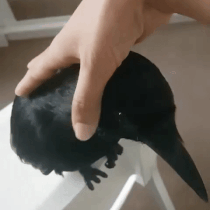
When I was a small girl, I walked through the market
Holding my dad's hand, mitten in gloved hand
At night there were roses, lit up in glass boxes
The heat lamps would keep them from freezing in winter
We never bought them, but somebody must have
Maybe they made it, or maybe they froze up
Before any person had put them in water
And hoped that they'd still be alive by the morning
- Sellers of Flowers (Regina Spektor)
What's a Sylph, anyway?
The fandom consensus seems to be that sylphs heal in some way, or offer other mysterious fae magical assistance. We don't know more than that and what Kanaya sort of facetiously says once, which is that a Sylph is "sort of like a Witch but more magical". Does she mean that? Does she mean that they're nothing alike?
In the end it's your own call what your Sylphs do, and I think you have to define that explicitly for your own fansession.
In my case, I never paid any attention to sylphs at all until someone who was too emotionally dependent on me assigned me Sylph of Heart, and I got so offended (for lack of a better word) that I fell into a research hole and never emerged.
That's coloured my personal interpretation of the class, which is that they're something like a maid but more remote, and something like a witch but more remote, and something like a mage but less remote, and something like a page but less remote.
I think sylphs are... well, ok, let's digress and travel in time for a moment.
You know about Joseph Campbell's hero's journey, a survey of (a limited set of) folklore that uncovered some archetypes that have since this time plagued psychologists with pseudoscience and folklorists with dubious methodology.
You may not know that all this had such a stranglehold on the world that people took it fully seriously as a way for a man to realize himself, in a way presaging the current manosphere. But then that begs the question, what about women?
Enter Maureen Murdock, a student of Campbell's who asked him if women could also have heroic journeys of actualization, and was met with a dumbfounded look out of eyes that had never thought women might need to develop at all.
Well no, said Campbell, women are the thing men are striving to be worthy of. Why would they need to mature?
So of course then in her work as a therapist (working mostly again with the certain type of women drawn to her practice), Murdock identified a common path towards women (in her own, American culture and ones like it) feeling like whole people. Mostly it's about a process of trying to figure out what a woman is, a real flesh and blood breathing woman, and how to be and do that in women's way; there is unfortunate and dated secondwavey phrasing, but it's a solid thing all told.
For a time this has floated around as a kind of Heroine's Journey. It never attempted to actually be folkloristics, and as psychology it suffered at first from the "Undergrad Students Desperate For Study Payments On One Specific Homogeneous Campus Have Really Fucked Lives, More At 11" thing, which also gave us the false idea that absolutely everyone fantasizes about being violated.
But it has a point: for a woman in a patriarchy (which, to return to Homestuck, is allegorized by the female-centric, but still reproductively oppressive society which Kanaya and Porrim are vital to, but readable as marginalized in) to figure out who she is, she has to figure out what a woman is, in a context without much of value to say on the issue. She has to go through sort of an attempt to become other things, things other people want from her, and then eventually find herself.
Personally this is not my culture or my take on womanhood in real life, but at this point we are talking about interpreting Homestuck through the culture that produced Andrew Hussie, and I think it's useful for classpecting purposes.
To me a Sylph is kind of a response to this. I don't want to get into authorial intent because no one can know about that, but in real life a sylph is sort of an amorphous, ageless, healing, positive elemental spirit. So then a Homestuck Sylph is always a player in a social role of their society that corresponds to that - passive, mysticized, anodyne. Mysterious, but not because there needs to be much there. Mysterious because it's irrelevant to the other heroes' journey, which the sylph is led to believe they're there to support.
Morgan Le Fay. The Lady of the Lake on her magical island. Vasilissa the Wise. Ninian, one supposes. Even Kanaya in her fertility-focused mystery cult. All those lovely flat marriageable wise jinni princesses.
Our two canon sylphs are Kanaya - obviously - and Aranea, whose narrative role is to help everyone mystically see and do a bunch of shit they need to, enable things to happen that ought to happen, and not particularly actively do anything else. But do they actually have to stay in that role, or is the point to transcend its limitations and come into one's own?
I would argue that it is, and that we can see that through the character of Porrim, who after all is sort of a parody of and response to the early fan response to Kanaya. We can also see it through the visceral imagery of how Kanaya saves the species (by killing her virgin mother-sister and extracting her womb/ootheca/budding clone).
So then: yes, sylphs heal or fix others and their fuck ups and life situations, but they also heal themselves and their world and their society's relation to the world. Their mystic function can be argued as something like restoring or finding balance, not necessarily the outcome their party wants or thinks it needs. In that way they might also be read as related to Pages, who go through the same journey of being everything but themselves but for the other binary gender.
Of course gender isn't really the important variable here, it's societal position -- your own sylph's journey can be about whatever you want, as long as it involves dealing with and negotiating the sort of mystic pedestal that people put them on for whatever reason.
That's what I think a Sylph is. They create, repair and preserve the appropriate amount of their aspect for the good of their group, but not because they're "only" good for that or "meant" to do it or somehow "ethereal creatures of [Aspect]" - just because it's necessary, because their aspect is out of balance, because someone has to look at it differently.
I have a fuchsia sylph (of hope) in an unfinished fanwork, Matsya, who might also be instructive as to sylphage and sylphing and so on; in that fanon trolls have a bit more obviously insectile biology, and Matsya is a laying worker, a "mutation" which is normally treated badly in a no longer hive-based society that got this way by chattelizing its queen morph.
But her position (as a queen, the feudal position, in the empire currently run by her biological aunt) gives her breathing room to think about it instead of being bioengineered into the "correct" morph or blacklisted from work appropriate to her caste, and the tension of having that breathing room and no idea what it's really like for others puts her into conflict with others in the setting. The point then isn't necessarily that a sylph Must be marginalized, but that the sylph has to be forced to confront the way that their society runs, react to it, and work to somehow "heal" the problem. Healing bodies and (or) minds can be a component of that -- Matsya for instance can passively inspire people, and insofar as she heals anyone before her gtier powers kick on, it's because all animals can heal themselves better when they don't feel pain and fear. But a Sylph of Rage would nurture and encourage or at least inspire something totally different - and in this way, a Sylph is like an active Muse.
Matsya accomplishes this in a way that restores Hope for a future (by integrating helpful ritual and mystic concepts from the past to serve the present), Kanaya does all this in canon for the aspect of Space by rescuing her species' potential and physical existence, and Aranea I think initially fails to do much more than literally helping Terezi see things because she's too busy playing Captain Save-a-Hoe to think of her role as fixing things in the world, in addition to problems in people.
Aranea's realization as a Sylph is too late for her party (and would probably have mostly benefited her anyway, as her aspect was Light - which is most directly luck, and she was by then working kind of blackhat hackerishly), but I think it comes at some point on the timeline tangential to Act 6, when she appears to be creating and manipulating circumstances and societal constants and understandings to get the Ring of Life (such as by putting John to sleep with her cerulean powers so that he can beat Tavros to it).
But anyhow, that's what I think a Sylph is -- someone who works with and resolves what they're given, in a somewhat more holistic and less servile way than a Maid -- insofar as I write Sylphs any particular way. As always, your mileage may vary.
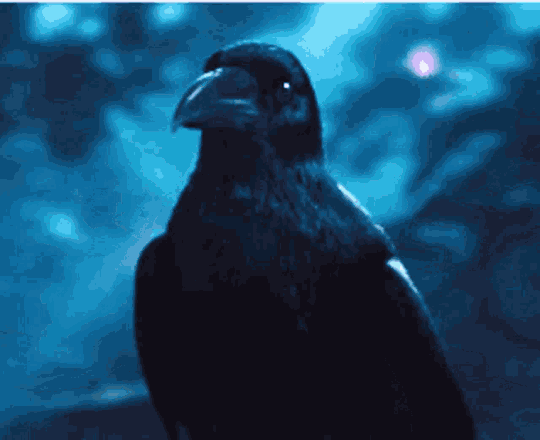
Who's the winner?
Not the roses,
Not the buyers, not the sellers,
Not the tellers of the stories,
Not the fathers, not their children.
Not those walking on a dark night
Through a memory they're forgetting.
Who's the winner?
Who's the winner?
Maybe winter, maybe winter...
I like this, what about the aspect of Doom?
Doom is straightforwardly about Law, but not in the cyclic sense of Time - in the linear sense of the wyrd of Norse sagas. Inevitable things, death, endings, suffering, decay. But also the emergence of order, through restriction; the imposition of law, Law and Law (the difference is like the difference between the law that makes jaywalking a crime in the USA, sharia, and the law of gravity). In a way, the yin to life's yang -- the antithesis of struggle, striving, flourishing and self-definition, but equally concerned with the way of things. And uniquely concerned with justice; doom is the aspect that governs and introduces the Just and Heroic Death rule, after all.
In the Slavic languages (famously very fatalistic) and in Yiddish there are words that reflect something I think is good to know about Doom and inevitable things; sudba, a neutral word for destiny meaning the thing judged for you, and mazal, both one of a canonical set of lucky stars and luck or fortune as derived from your birth underneath them. People use these words somewhat fatalistically, as in, you miss a shot or lose money to a casino and you say, oh, well it wasn't destined anyway, or oh, my lucky star is off duty tonight I guess. And then you go on with your life, because it's not always all going to be death doom suffering peril death doom death, even if you think it is. Usually something good happens afterward and you remember that your deity or force of choice isn't always completely drunk, just a lot of the time -- and that it does still have to look out for you occasionally.
A Doom player doesn't necessarily need to be dark or unpersonable (my fankid Eden and her uncle Yoel, also a Doom player in a different timeline, aren't, and neither are canon's Sollux and Mituna) -- they just need to have a character arc resolving around some relation to inevitability, law, decline and decay. None of these are necessarily bad things, though Sollux's case might reflect manifestations that are! Inevitability is part of the way of things, and decay, as the Tumblr lore goes, exists as an extant form of life.
And both together now:
In a sylph's case, because their role is to generate, maintain, resolve, repair and re-examine their aspect, yes, the Doom of their session is probably somehow flawed -- or maybe there's a lack of Doom, altogether, and they need to be the one to direct and contextualize the team. The sylph's personal life and journey is probably strongly tied in with beliefs about law and destiny and (by extension) belonging, meaning and social thought -- they could be pathologically unlucky, they could just be a person who believes in justice in a broken system. My partner's Heir of Doom, Aryyeh, has an inversion of this arc where he's placed to uphold and perpetuate damaged systems, but has to grow into someone who can do something about it - Heir of Doom (future perpetrator of crimes against trollkind) to Heir of Doom (worthy instrument of a new and kinder Law).
Either Doom or the Sylph's relation to Doom or both are unhealthy, and in the spirit of their classpect, they're meant to dial down and take things slow and thoughtfully. And of course, maybe they were born to and moulded by it... but I think their bigger concern is that their session itself might be doomed from the get-go. Don't you? ;)
6 notes
·
View notes
Note
sylph of doom
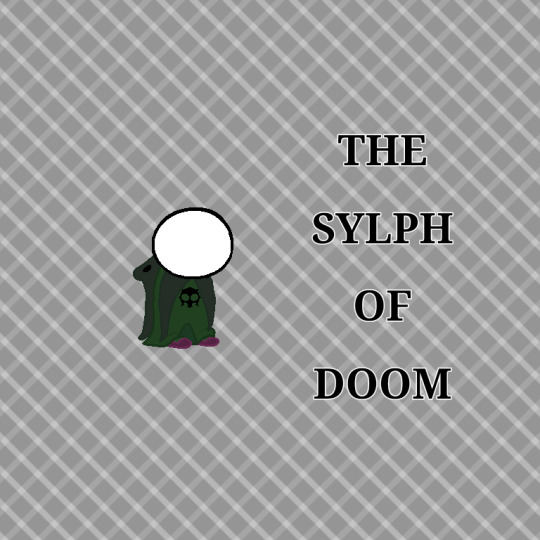
The Sylph of Doom
The Sylph of Doom is someone who prefers to follow the rules and conform, making their own rules if there aren’t any or if they’re not satisfied with the rules and regulations currently in place. The Sylph of Doom is pessimistic and cautious, they think everything through multiple times and they’re not the kind of person to trust easily, so if they give you their trust you know that you’re close to them.
They probably find others of whom are relentlessly positive and optimistic to be quite bothersome, trying to instil a sort of pessimism or reasoning within their heads. The Sylph of Doom looks out for those around them, they watch and learn and they offer their advice to those around them even if it wasn’t asked for or needed. The Sylph of Doom might seem like a downer, with their opposite of a Can-Do attitude and how they’re always pushing people back down, but they don’t mean harm with this.
They have good intentions, they want to help others learn and discover that the world won’t be kind to you and you can’t always rush into things blind, sometimes you have to stop and observe before you act to prevent yourself from getting hurt. The Sylph of Doom isn’t really the adventurous type, preferring to keep their feet on the ground and stick to basic tasks and activities, nothing that causes them too much stress or Doom in the end.
#homestuck#homestuck classpect#homestuck 2#classpects#homestuck2#homestuck aspect#homestuck aspects#homestuckclasses#homestucksylph#homestucksylphclass#homestuckdoom#homestuckdoomaspect#sylph of doom
8 notes
·
View notes
